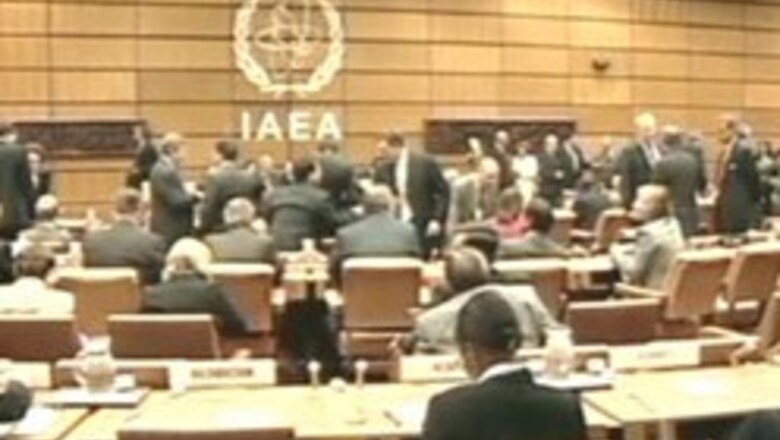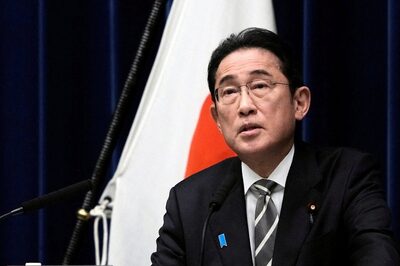
views
Supporters of the Indo-US nuclear deal say it would help in solving the country’s energy needs and end its nuclear apartheid. Critics say the deal would put India in the grip of America and end India’s nuclear sovereignty. What does India gain from the deal? Does the deal endanger sovereignty? Arundhati Ghose, India’s former ambassador to the UN, explained the pros and cons in a web chat. Excerpts from the chat.
Vinu: Is it true that India is running out of Uranium and needs the Indo-US nuclear deal badly to free her own stockpiles of uranium for continuing its strategic nuclear programme. Also by not placing under safeguards mean they are to be used for strategic military purposes. Please clarify.
Arundhati Ghose: India does not have large supplies of uranium. In any case, our uranium is low grade. We have also not been able to mine the uranium we have due not only to financial constraints, but also, due to environmental objections from local groups. Even if this were overcome, we would not have enough to meet our energy demands. Eight reactors have been left out of those classified as civilian in the separation plan. If we need to use them for producing fissile materials for weapons, we could do so.
Taku Chatung: What is the concept of ‘safeguards agreement’ and likely to be after agreement with the IAEA board of director?
Arundhati Ghose: A safeguard agreement signed with the IAEA (International Atomic Energy Agency) ensures that none of the material or facilities which are safeguarded are diverted for military purposes. This is particularly relevant for imported facilities and material including fuel. This is done through routine inspections by teams of IAEA experts working with our scientists at the facilities which have been identified for safeguards.
Murugan: How does the Hyde Act bind India? Is it against our sovereign interests?
Arundhati Ghose: The Hyde Act is an internal, domestic law of the US. It enables the US government to enter into an agreement with India for civil nuclear deal cooperation, which was not permitted under existing US laws. The Hyde Act has been passed. Once the deal is approved by the US Congress, it will be the latest expression of the sovereign will of the US and according to the US constitution will prevail over the Hyde Act which had only enabled this agreement.
Dinesh: Can you point out any one risk that we have to face by signing this deal? I don't agree with the Left, but still as layman I am interested to know is there any issue that is not good for India in this deal?
Arundhati Ghose: The US is going out of its way to help us in this deal. They have even changed their domestic law to enable them to push this forward. My worry is what do they expect in return? Would we be able to tackle these expectations with the delicate diplomacy that is required? It is a new world and we have to learn how to live with it.
Arjun: How does nuclear energy help us satisfy our energy needs? It will make up only a small fraction of our energy requirements. The essence of this deal is politics and the need for India to get out of the isolation it finds itself in the nuclear arena. Why raise this bogie of energy security?
PAGE_BREAK
Arundhati Ghose: If a decision is taken that we should rely on nuclear energy, we could follow the example of France, 80 per cent of whose electricity needs are met from nuclear energy. There is no constraint on how far we wish to go if we can participate in international trade. At least 40 per cent of Japan's electricity needs are met from nuclear energy and they are planning to rasie that to 60 per cent. Countries in the Middle East, fearing the exhaustion of oil reserves, are also turning to nuclear energy as are countries like Vietnam, Indonesia, Brazil and South Africa.
Arjun: Once we separate civilian reactors from nuclear reactors and report the same to IAEA, every country on earth will know how much fissile material we can produce and how many nuclear weapons we might have. How does that not compromise our national security interests?
Arundhati Ghose: The existence of Indian reactors is already known even if they are not udner safeguards. There are detailed estimates of how much fissile material we have. All this is public but not confirmed by us. At the moment we have 22 reactors of which six are already under safeguards. According to the separation plan of March 2006, we will offer eight more reactors for safeguards. This would leave eight reactors for our military programme. Should we require more reactors, there is nothing in this agreement there is nothing in this agreement which prevents us from building more reactors for our weapons programme.
Mukesh: Many analysts say that US technology in Nuclear energy is outdated. The deal would only strengthen US companies' interest in India, the way they made profit in Afghanistan or Iraq construction. Is there any truth in it? And, given France's capability in power generation through peaceful use of nuclear energy, wouldn't it have been better that India could have sought an alliance with France than US?
Arundhati Ghose: There are several misunderstandings implicit in your question. The US technology (Westing House/Toshiba) has the latest technology in reactors. They are supplying two reactors to China. In any case, once the deal goes through, India is not obligated to place any orders with companies which are not competitive, technologically or price wise. India has signed nuclear cooperation agreements with France and Russia. We are unable to implement these agreements without NSG waiver. Since the NSG is a creation of the US, we need the US on our side to get this waiver. This was the advice given to us by Russia and France.
Rohit Arora: In case we won't get the supply of Uranium for our reactors then the agreement will be null and void and can we after that pull our reactors out of IAEA watchdogs?
Arundhati Ghose: The draft Safeguards Agreement, which has been negotiated by India with the IAEA secretariat, contains a provision that none of our facilities will be placed under safeguards unless we are assured of reliable and uninterrupted fuel supplies. Since a Safeguard Agreement will have to be signed as each facility is notified to the IAEA, we can use the time to negotiate supply contracts with companies which wish to cooperate with us by supplying reactors. There are some circumstances under which a facility can be taken out of safeguards. This is in the draft agreement which still has to be approved by the IAEA.
PAGE_BREAK
Vivek Jain: In case India gets NSG waiver, but the 123 agreement is not approved either by Parliament of India or by the US Congress, will India be in a position to do nuclear trade with France and Russia with which we probably may have a more favorable deal?
Arundhati Ghose: Only if India gets the NSG waiver, can it trade with other countries in nuclear material and technologies. If the US Congress does not approve it, obviously we would not be able to trade with the United States. But this is extremely unlikely. Legally, parliamentary approval is not necessary for concluding this deal. However, the political compulsions remain.
Sharad: If we are signing the nuclear deal then why not sign the CTBT?
Arundhati Ghose: The CTBT prevents a country, which signs it, from conducting any explosive tests. These tests are required to refine and upgrade weapons and weapons design. The deal is about India's access to civilian nuclear energy globally. It is not to do with our weapons programme. In fact, care has been taken to ensure that the deal does not impinge on our military programme.
Uddhavraj C Temkar: Post Indo-US nuclear deal, do you think US can discriminate with India on nuclear matters in the future? And, what is your view on how the Indian govt. should address all safeguard issue with transparency?
Arundhati Ghose: It is precisely to remove the discrimination which currently exists against India that the Indo-US nuclear deal is meant to meet. It is unlikely that the US, which is a partner in this deal and is working extremely hard to see that it gets through will go back on it and discriminate against India again. The Safeguards Agreement is with the International Atomic Agency, which is a multi-lateral body and whose activities are overseen by an international board of governors. India has been a member of the board ever sicne the IAEA was formed. The proceedings of the IAEA are made available to the public. However, on issues such as inspections, confidentiality is maintained at our request, at the request of the country being inspected.
Rajul T V: There is lot of uncertainty going on about the nuclear deal.
Arundhati Ghose: The benefits of the nuclear are clear. First, it will give us access to an additional source of electricity which our economy needs. Secondly, it will give us access to high-tech from which we were barred for 30 years by sanctions imposed by the world. In addition, our scientists and experts in areas such as space, nano technology, medicine etc will be able to work with their counterparts around the world. This can only be to the advantage of India.



















Comments
0 comment